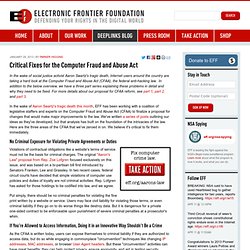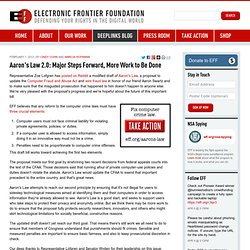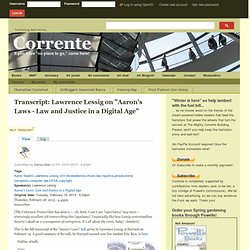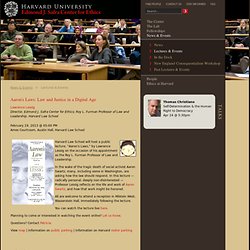

Critical Fixes for the Computer Fraud and Abuse Act. In the wake of social justice activist Aaron Swartz's tragic death, Internet users around the country are taking a hard look at the Computer Fraud and Abuse Act (CFAA), the federal anti-hacking law.

In addition to the below overview, we have a three part series explaining these problems in detail and why they need to be fixed. For more details about our proposal for CFAA reform, see part 1, part 2, and part 3. In the wake of Aaron Swartz's tragic death this month, EFF has been working with a coalition of legislative staffers and experts on the Computer Fraud and Abuse Act (CFAA) to finalize a proposal for changes that would make major improvements to the law. We've written a series of posts outlining our ideas as they've developed, but that analysis has built on the foundation of the intricacies of the law. Here are the three areas of the CFAA that we've zeroed in on. No Criminal Exposure for Violating Private Agreements or Duties Make Penalties Proportionate to Offenses.
Aaron's Law 2.0: Major Steps Forward, More Work to Be Done. Representative Zoe Lofgren has posted on Reddit a modified draft of Aaron's Law, a proposal to update the Computer Fraud and Abuse Act and wire fraud law in honor of our friend Aaron Swartz and to make sure that the misguided prosecution that happened to him doesn't happen to anyone else.

We're very pleased with the proposal's progress and we're hopeful about the future of this important bill. EFF believes that any reform to the computer crime laws must have three crucial elements: Computer users must not face criminal liability for violating private agreements, policies, or duties.If a computer user is allowed to access information, simply doing it in an innovative way must not be a crime.Penalties need to be proportionate to computer crime offenses.
This draft bill works toward achieving the first two elements. The proposal meets our first goal by enshrining two recent decisions from federal appeals courts into the text of the CFAA. The updated draft doesn't yet reach our third goal. Reform Draconian Computer Crime Law. Transcript: Lawrence Lessig on "Aaron's Laws - Law and Justice in a Digital Age" [The Unknown Transcriber has done a --- oh, heck, I can't use "superlative" any more -- stunningly excellent job transcribing this [applause].

I especially like how Lessig contextualizes Swartz's death as a consequence of corruption. It's all about the rents, baby! --lambert] This is the full transcript of the "Aaron's Laws" talk given by Lawrence Lessig at Harvard on February 19. A good summary of the talk, by Harvard second-year law student Eric Rice, is here. Outline of talk:Intro (1) Aaron (2) Aaron's works – B©, ©, A© (3) As a citizen (4) The "crime" (5) Godzilla meets Jefferson and Thoreau (6) Aaron's laws Closing: Aaron and usAudience Q&A #1 - The arrest, MIT and Secret Service, and Abelson report?
Lessig begins at about 8:50. Clicking on the centered images of Lessig's slides below should take you to that spot in the YouTube. Lawrence Lessig: Thank you, Martha, and from a distance thank you, Roy L. But I need to mark this conversation by recognizing how inappropriate it is. Lectures & Events. Harvard Law School will host a public lecture, "Aaron's Laws," by Lawrence Lessig on the occasion of his appointment as the Roy L.

Furman Professor of Law and Leadership. In the wake of the tragic death of social activist Aaron Swartz, many, including some in Washington, are asking how the law should respond. In this lecture — radically personal, deeply non-disinterested — Professor Lessig reflects on the life and work of Aaron Swartz, and how that work might be honored. All are welcome to attend a reception in Milstein West, Wasserstein Hall, immediately following the lecture.
You can watch the lecture live here. Planning to come or interested in watching the event online? Questions? View map | Information on public parking | Information on Harvard visitor parking.